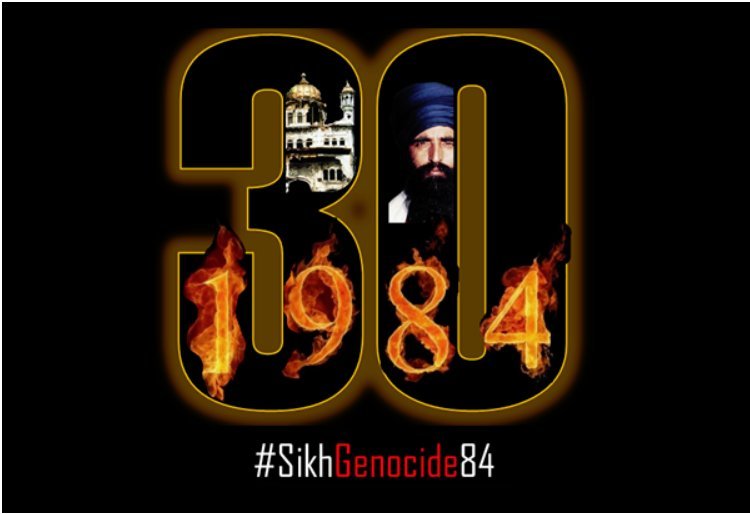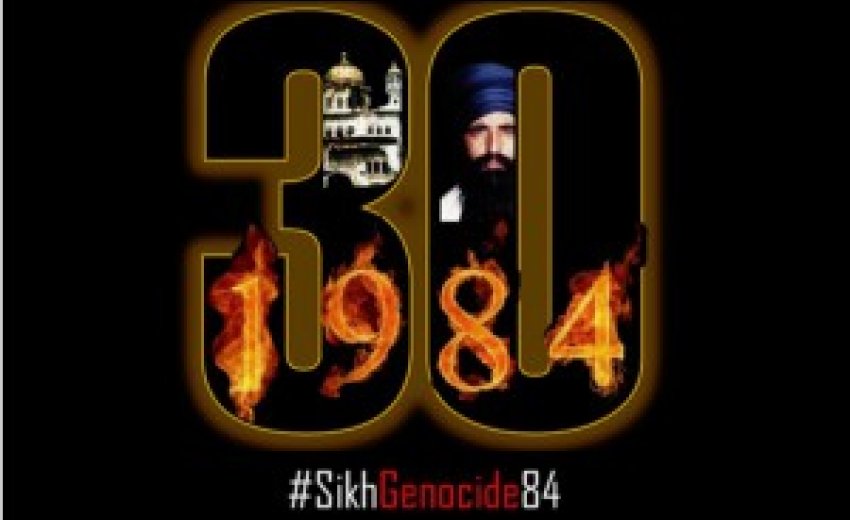
Glasgow, United Kingdom (June 06, 2014): Claire Fuller, Press Secretary of Global Minorities Alliance (GMA) sent a statement to the Sikh Siyasat News (SSN), expressing solidarity with the Sikhs on 30th anniversary of ghallughara June 1984.
The statement/ press release (by GMA) reads as follows:
A human rights organisation is urging people to stand in solidarity with Sikh communities around the world to mark the 30th anniversary of the infamous Operation Blue Star, a massacre of thousands of Sikhs at their holiest shrine, the Golden temple, by the Indian army.
The massacre took place in Amritsar on a holy day, when the temple was packed with worshippers. Helicopters, tanks and heavy weaponry was utilised in the attack which traumatised the Sikh community worldwide.
Global Minorities Alliance, a group fighting for the rights of minority groups worldwide, along with the global Sikh community, will be commemorating the massacre throughout the week, with a minute’s silence taking place on 6 June at 11am to remember those who suffered 30 years ago, and those Sikhs who continue to suffer from discrimination in India.
A march between Hyde Park and Trafalgar Square on 8 June will also take place in London to commemorate this event.
The Sikh population in India has been persecuted for centuries. Many see the 1984 massacre as a genocidal attack on their religion rather than an assault on militants as the official Indian government story states.
The Indian army killed indiscriminately and without warning, desecrating the temple and killing men, women and children. Sacred scriptures which Sikhs consider alive – as the holiest of their religious items – were filled with bullet holes and destroyed. To this day, the event deeply affects Sikhs in the Punjab region and worldwide.
The attack took place over a number of days, with claims that bullets started flying into the complex as early as the 1 June, and continuing for the next seven days. This led to increased tensions between communities, and after the then Indian president Indira Gandhi was murdered by her Sikh bodyguards, Vikramdeep Singh of the Sikh Awareness Society told GMA that the government responded by ‘giving electoral lists to the public so that they could attack Sikhs, and eye witnesses say that the police stood by as rape, torture and murder of Sikhs took place.’
Flaws in official government reports on the Blue Star massacre added insult to injury for those affected. Claims of unlawful detention and curfews imposed upon worshippers – meaning they were unable to leave the complex – were omitted from official reports. In addition, the claim from the official government white paper that ‘troops exercised great restraint’ rubbed salt in the wounds of the traumatized Sikh community.
Members of the press and Red Cross were restricted from accessing the temple during the bloodshed, meaning that the world was initially blind to the horrors of the massacre. The official number of dead stands at around 400, a number which is highly disputed by Sikhs. “Thousands were killed or disappeared,” Balvinder Kaur of the Sikh Council UK told GMA. “Their families to this date do not know of their whereabouts.” The Sikh community to this day feel that justice has not been served to the Indian government and the generals who carried out the atrocity. Balvinder Kaur disputes the government pretext of security:
“The background to this barbaric action was that the Sikhs were campaigning peacefully for greater religious rights and autonomy for states.”
Many other anti-Sikh massacres took place in India in 1984 under the excuse of flushing out militants, as well as many hate acts towards Sikhs, such as cigarettes being stuck to a poster of the fourth guru’s face and a picture of the Golden Temple. To this day very few of those responsible for the events of 1984 have been prosecuted.
The bitterness which the Sikh community worldwide still feel towards the atrocity was brought into light by the 2012 assault on the now retired general who led Operation Blue Star; four British Sikhs were convicted in 2013 of these assaults. When speaking at this trial, however, General Kuldeep Singh Brar denied responsibility for the atrocity, again claiming that the attack was carried out against militants, and calling the massacre a ‘necessary’ response to Indian soldiers being attacked when entering the temple, rather than an act of violence.
Many official accounts of the massacre claim that Sikhs in the temple were demanding the creation of Khalistan, an independent Sikh state. Vikramdeep Singh says that these reports were designed to increase hostility towards the Sikh community, and that in reality the Sikh position was that ‘if they say they will separate us, we will go, but it is not our demand’.
Vikramdeep Singh also told GMA that the unjust treatment of Sikhs in India continues, saying that ‘when we protest peacefully, we are met with live bullets’, and commenting on the fight by the Indian authorities to ignore Sikh history, despite its importance to the Punjab region. Singh says that to this day, the Indian authorities fight any attempts at Sikh empowerment.
Global Minorities Alliance’s Chief Executive Manassi Bernard offered support for Sikh people at this difficult time, commenting that:
“Global Minorities Alliance stands in solidarity with the Sikhs of India and mourns their losses alongside them, which is why we will be marking the one minute silence on 6 June. We also join others in calling for the new Indian Prime Minister, Narendra Modi, to investigate Operation Blue Star and the role of the Indian government and military in the events, to help the Sikh community to draw a line under this tragic event in the holiest of places.
“Thirty years have gone by since the Golden Temple massacre, but the incident still causes a lot of confusion and pain for grieving Sikhs around the world. There are still so many unanswered questions about the number of deaths and casualties, the simultaneous attacks on other Gurdwaras, the date of the operation given that there would be so many pilgrims there, etc. The list of unanswered questions goes on and on, and Sikhs in India and around the world are struggling to move on from what is seen by many as an attack on a minority community rather than a military operation.”
GMA urge all who can to partake in the minute’s silence on 6 June, and to remember the attack on the Golden Temple as an act of brutal oppression of a minority group, as well as giving a thought to the continued oppression of Sikh people in India.
